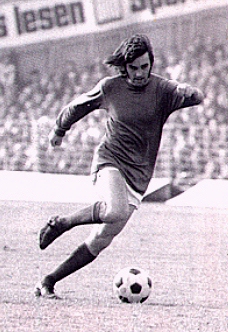conker n. 1. Horse chestnut. 2. (~s) Game played by children. To play this game, one first drills a small hole through the
middle of a conker, and threads a string through this hole. The conker is then suspended by one child, while the other, using
his conker, tries to smash the suspended conker with his. Turns alternate. The winner is the child whose conker does not
break. This leads to uncommon industry on the part of children (of all ages) in an effort to make their conker as tough as
possible.
 |
Sarah Greene (1980-83) Where to begin? Urban myth relates that there is a university pool table in Hull commemorating
Greene' achievements thereon with the local rugby team. Arrived at the 'Peter chubby-cheeked and brunette, fled as a blonde saucepot to SATURDAY SUPERSTORE (qv.) before marrying MIKE SMITH and spoiling everything. |
 |
Blue Peter badges are awarded to children under 16 years
(See above) |
coming for one phrase. 1. Phrase meaning ``Are you coming to the pub for a pint of?''
pint
of (pint-ah) n. 1. The basic unit of drink in the U.K., as in, ``A pint of bitter, please.'' One should never ask for half a
pint as the bartender will only hear the word pint. If you really must have half a pint, refrain from using pint and say, ``Half ofbitter, please.''
bangers n. 1. Sausages. A very common meal is bangers and mash (sausages and mashed potatoes). The sausages are
called bangers because they will burst if you do not pierce them while they are cooking.
pasty (pah-stee) n. 1. A type of meat and potato pie. Pasties may come from either Cornwall or Devonshire (where they are
called tiddy oggies). A Cornish pasty purchased outside Cornwall resembles a sausage roll that's been stood on and does
not resemble one bought in Cornwall. There's also a curry pasty which is a delicious Jamaican concoction available from
superior chippies.
sticky wicket phrase. A difficult situation. This phrase originates in the game of cricket.
``The machine gun nest had us covered. It really was a sticky wicket.''
bloody hell (blud-ee-el) expletive. This blasphemous expression may be used to voice one's incredulity about something just
said. This is equivalent to the American phrase ``Why, Gosh. Who would have thought!''
 |
George Best Manchester United & Irish International Football Star |


